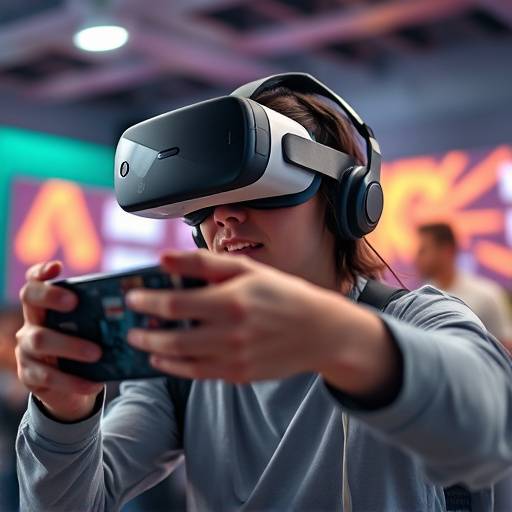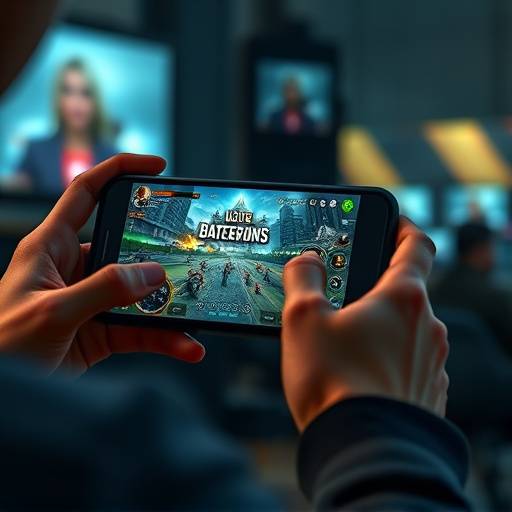Augmented and Virtual Reality Integration

Augmented Reality (AR) and Virtual Reality (VR) are poised to revolutionize mobile gaming, offering immersive experiences that blur the lines between the digital and physical worlds. Imagine battling dragons in your living room or exploring ancient ruins through a VR portal on your phone. The potential is limitless.
The advancements in mobile device capabilities, coupled with the development of more accessible and affordable AR/VR headsets, are driving this trend. Games like Pokémon GO have already demonstrated the power of AR, and future titles are expected to push the boundaries even further.
- Enhanced immersion and presence in the game world.
- New gameplay mechanics that leverage real-world environments.
- Social gaming experiences that transcend physical limitations.
- Opportunities for innovative storytelling and world-building.
Leading developers like NetEase and Tencent are investing heavily in AR/VR technologies, creating innovative experiences that cater to the mobile gaming audience. We can expect to see a surge in AR/VR-enhanced mobile games in the coming years, transforming the way we play and interact with virtual worlds.
"AR and VR are not just trends; they are fundamental shifts in how we experience and interact with digital content. Mobile gaming is perfectly positioned to capitalize on these technologies and deliver truly transformative experiences." Dr. Anya Sharma, Lead Researcher at the Gaming Innovation Lab, University of Toronto
Cloud Gaming Revolution: Gaming Without Limits

Cloud gaming is set to democratize access to high-end gaming experiences. By streaming games from powerful servers directly to mobile devices, players can enjoy graphically demanding titles without the need for expensive hardware. Services like GeForce Now, Xbox Cloud Gaming, and Google Stadia (though Stadia has ended, the technology's influence persists) are paving the way for this future.
The benefits of cloud gaming are numerous:
- Access to a vast library of games without large downloads or storage requirements.
- Ability to play on any mobile device, regardless of its specifications.
- Cross-platform compatibility, allowing players to seamlessly switch between devices.
- Reduced hardware costs, making high-quality gaming more accessible.
The key challenges for cloud gaming are ensuring low latency and stable internet connections. As 5G technology becomes more widespread and internet infrastructure improves, these challenges are being addressed, making cloud gaming a viable and increasingly attractive option for mobile gamers.
Analysts predict that cloud gaming will become a multi-billion dollar industry in the next few years, transforming the mobile gaming landscape and opening up new opportunities for developers and players alike. Companies like Sony and Microsoft are heavily invested in cloud gaming, indicating the long-term potential of this technology.
"Cloud gaming is the future of mobile gaming. It breaks down the barriers of hardware limitations and opens up a world of possibilities for developers to create immersive and visually stunning experiences that can be enjoyed by anyone, anywhere." Kenji Tanaka, CEO of Stellaris Games, Tokyo
Mobile Esports: The Rise of Competitive Gaming on the Go

Mobile esports is experiencing explosive growth, with popular titles like PUBG Mobile, Arena of Valor, and Call of Duty: Mobile attracting massive audiences and professional players worldwide. These games offer competitive gameplay, strategic depth, and engaging spectator experiences, making them ideal for the esports arena.
Several factors are contributing to the rise of mobile esports:
- Increased accessibility of mobile devices and high-speed internet.
- Growing popularity of mobile gaming among younger generations.
- Development of dedicated mobile esports platforms and tournaments.
- Significant investment from sponsors and organizations.
Mobile esports tournaments are now offering substantial prize pools and attracting millions of viewers online and in person. The professional mobile gaming scene is becoming increasingly sophisticated, with dedicated teams, coaches, and training facilities.
We can expect to see further growth in mobile esports in the coming years, with new games emerging and existing titles evolving to meet the demands of the competitive scene. The mobile esports industry is poised to become a major force in the global gaming market.
"Mobile esports is not just a niche market; it's a global phenomenon. The accessibility and competitive nature of mobile games have created a vibrant esports ecosystem that is attracting players, viewers, and investors from around the world." Isabelle Dubois, Esports Analyst at Global Gaming Insights, Paris
Advancements in Mobile Hardware: Powering the Future of Gaming

The mobile gaming experience is constantly evolving thanks to rapid advancements in mobile hardware. Powerful processors, improved graphics capabilities, high refresh rate displays, and advanced cooling systems are enabling mobile devices to deliver console-quality gaming experiences.
Key hardware innovations include:
- New mobile processors with enhanced CPU and GPU performance.
- High refresh rate displays for smoother and more responsive gameplay.
- Advanced cooling systems to prevent overheating during extended gaming sessions.
- Improved battery life to support longer playtime.
- Dedicated gaming buttons and triggers for enhanced control.
Gaming smartphones are becoming increasingly popular, offering specialized features and designs that cater to the needs of mobile gamers. These devices are pushing the boundaries of mobile gaming performance and paving the way for even more immersive and visually stunning experiences.
Companies like ASUS (with the ROG Phone series), Nubia (with the RedMagic series), and Xiaomi (with the Black Shark series) are at the forefront of mobile gaming hardware innovation, continuously pushing the boundaries of what's possible on a mobile device. These advancements are crucial for the continued growth and evolution of mobile gaming.
"The advancements in mobile hardware are revolutionizing the gaming industry. Mobile devices are now capable of delivering experiences that rival consoles, opening up new opportunities for developers to create visually stunning and immersive games that can be enjoyed on the go." Hiroshi Nakamura, Hardware Engineer at MobileTech Innovations, Osaka